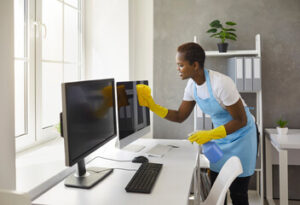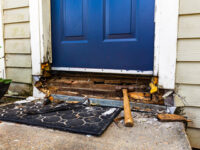The Different Types of Commercial Cleaning
Commercial Cleaning is a crucial service that helps maintain hygienic and safe environments in businesses involving people. While it may seem similar to janitorial services, there are important distinctions between these two types of cleaning.

Commercial cleaning companies typically have more sophisticated equipment and specialized tools for tasks such as power washing, high-rise window cleaning, floor stripping, and waxing. They also use industrial-grade cleaning and sanitizing agents. Contact Commercial Cleaning Winnipeg for professional help.
The offices of businesses require cleaning services that go beyond the basic janitorial tasks performed in residential spaces. For example, trash receptacles are emptied, floors are vacuumed and scrubbed or mopped, restrooms are disinfected, and windows are cleaned. These office cleaning services are essential to maintaining the professional image of businesses and ensuring that employees can work in a safe, healthy environment.
A clean, organized workspace allows employees to focus more effectively and efficiently, which ultimately benefits the business as a whole. Maintaining high standards of cleanliness in the workplace also helps safeguard against germs that could negatively impact productivity and increase the likelihood of costly liabilities.
In addition to standard cleaning services, commercial cleaners often provide specialized services like floor stripping and waxing, carpet steaming, power washing exterior walls and sidewalks, and extensive window washing in high-rise buildings. These specialized services are required in various industries such as medical offices, retail spaces, educational facilities, and hospitality venues.
Providing a comprehensive checklist reduces the need for cleaning staff to rely on their memory, resulting in more consistent and thorough cleaning. Checklists allow a clear line of communication between team members, increasing accountability and fostering a sense of ownership. Additionally, ensuring that cleaning products are readily available reduces the time spent looking for supplies and increases the efficiency of cleaning teams.
Keeping high traffic areas clear of clutter prevents injuries and distractions, which is essential in the busy environments of many commercial settings. Maintaining a tidy workplace also contributes to a positive customer experience and makes a lasting impression on visitors and clients. At Enhancity, we declutter lobbies, hallways, and reception areas to create an inviting atmosphere for employees and customers. We also declutter and sanitize employee kitchen and lunch rooms, office bathrooms, and all common spaces to create a clean and safe environment for everyone.
Retail
Retail spaces that deal with people need a regular cleaning service to ensure their customers are comfortable and confident in their shopping experience. Cleanliness is also a vital part of maintaining customer and employee health. Regularly cleaning the floors, sanitizing bathrooms and cleaning high-traffic areas helps prevent the spread of germs and bacteria throughout the store. Using a commercial cleaning checklist is a great way to keep track of all the areas that need attention and ensure nothing gets overlooked.
A commercial cleaning company will have the products and equipment to clear up hazardous waste, clean and disinfect floors, sanitize high-traffic areas, and wash and wipe down surfaces. They can offer flexible cleaning schedules and cater to the specific requirements of the business. For example, an electronics store with a large range of sensitive components may need to use specialized equipment that can handle chemical and solvent residues.
Commercial cleaners are also trained and security vetted for peace of mind. They can work independently or as part of a team and can be contracted to clean businesses, schools, hospitals, factories and many other types of premises. They are also qualified to use a wide variety of cleaning equipment and can clean areas that are typically out of reach or inaccessible, such as air ducts.
In comparison, residential cleaners focus on domestic and private spaces. Their responsibilities include vacuuming and dusting furniture and fixtures, washing kitchen appliances, and cleaning and wiping bathroom surfaces. Generally, they are hired for weekly or bi-weekly visits and can be tailored to the needs of individual homeowners. They often use household cleaning products and tools, whereas commercial cleaners will have industrial-grade equipment and a thorough understanding of various industry requirements.
Hospitality
Hospitality spaces require a range of different cleaning and sanitisation protocols to ensure cleanliness and safety across a broad range of indoor environments. From hotel lobbies and restaurants to guest rooms, common areas and kitchens, hospitality facilities must have a detailed checklist in place to guarantee that the appropriate protocols are followed. This helps to eliminate germs and pathogens, protect guests’ health and comfort, and create a welcoming environment.
Hospitality cleaners will typically be contracted rather than working as part of the in-house cleaning staff, and they may also need a wide range of specialised equipment and skills. This could include deep carpet cleaning, which removes embedded dirt and allergens; power washing driveways or sidewalks to get rid of stubborn grime; thorough window cleaning, even in high-rise buildings; or specialized services such as disinfection of air ducts and vents.
In addition to ensuring cleanliness standards, it’s important that hospitality cleaning contractors are aware of and comply with specific industry regulations, and have the right supplies on hand. For instance, hotels must use cleaning products with a neutral pH to ensure they are safe for guests and staff alike. They must also sanitise and disinfect equipment regularly to ensure it remains in good working order.
Another area in which hospitality cleaning contractors can help is implementing regular guest surveys, as this can provide valuable feedback to staff and management on areas where improvements can be made. For example, survey responses might highlight the need for better signage in guest bathrooms to show that they have been cleaned or sanitised recently.
Unlike residential cleaners, who generally work to a flexible schedule, or as part of the domestic staff at a home, commercial cleaning contractors operate on a set schedule and often during non-business hours so they don’t interrupt customers or clients. They are typically security vetted and trained to a professional standard, and they will be familiar with the requirements of various different industries. This means that they will be able to work effectively in offices, retail locations, medical offices, educational institutions and a range of other hospitality venues.
Manufacturing
Manufacturing facilities require a higher level of expertise and specialized cleaning equipment as they may contain harmful chemicals and materials that need to be handled with care. Oil and grease cleans, chemical spill cleaning, ventilation cleaning and machine and component cleaning are just some of the services needed for this type of commercial space.
Regular commercial cleaning helps maintain hygiene and safety standards, reduce employee absenteeism and improve productivity. It also enhances the professional image of a business and minimizes germs that could affect health and safety. Commercial cleaning companies can handle a variety of different environments with efficiency and consistency, using high-quality cleaning products and advanced equipment to ensure hygienic spaces for employees and customers.
The most common areas cleaned in a commercial space include restrooms, offices, and retail stores. The cleaning team will wash windows, sweep and mop floors, dust furniture and shelves, wipe down touch points, sanitize sinks and fixtures, disinfect surfaces, vacuum carpeting, and empty trash cans. Industrial cleaning requires a more robust approach, employing high-pressure washers, industrial cleaning solvents and chemical products, and decontamination processes in areas with hazardous waste.






